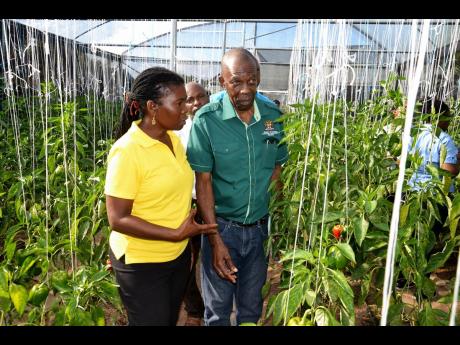St Mary farmers launch greenhouse project
The St Mary-based Elliott Farmers Community Enterprise (EFCE) launched its greenhouse project last month, signalling a boost to productivity in the Cromwell Land area of the parish.
The project, sponsored by the Special Climate Change Adaptation Fund of the Pilot Programme for Climate Resilience, and administered by the Environmental Foundation of Jamaica, sees the official opening of several greenhouses and the certification of eight female teachers who have been trained in greenhouse technology.
Four teachers from St Mary Technical, three from Marymount High, and one from Albion Mount Primary were trained by Cyril Chambers of EFCE and will, in turn, be training community women in the operation and management of a greenhouse.
Minister without portfolio in the agriculture ministry, J.C. Hutchinson, in officially launching the project, congratulated Marvalee Tomlinson-Russell of EFCE for initiating the project, which he said represents a tangible response to climate change
Hutchinson issued a challenge to St Mary farmers to make use of the vast amount of idle land in the parish and increase productivity.
He said St Mary is one of five locations where the Government will set up agro-economic zones, starting with one in St Elizabeth, which is scheduled to be functional by August this year.
Hutchinson also promised to assist with the development of the bamboo industry in St Mary, after Tomlinson-Russell had revealed that the EFCE is also seeking to promote bamboo as a sustainable industry, but is in need of training and tools for its members. Hutchinson said St Mary will now be included in a training programme to be undertaken by the Chinese as they assist in developing a local bamboo industry.
Commanding officer for Area Two, ACP Elbert Nelson, promised farmers that the praedial larceny unit will be revived in St Mary in order to prevent theft of their produce.
And Tomlinson-Russell, who founded the EFCE in 2016, later told The Gleaner that the project is focused on growing vegetables such as sweet pepper, kale and cilantro.
“We’re looking at agro-ecology and so we’re starting this sustainable production of vegetables. Our children need to eat better, we have to start producing, we have to start juicing for the children and stop letting them have this vast amount of sweets which is contributing to overweight and obesity. It’s a good project moving forward,” she pointed out.

